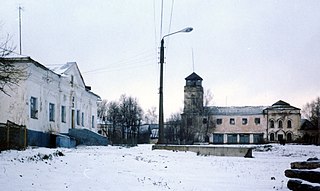
The Kingdom of Poland, informally known as Congress Poland or Russian Poland, was created in 1815 by the Congress of Vienna as a sovereign state of the Russian partition of Poland. Connected until 1832 by personal union with the Russian Empire under the Constitution of the Kingdom of Poland, it was gradually thereafter integrated politically into Russia over the course of the 19th century, made an official part of the Russian Empire in 1867, and finally replaced during World War I by the Central Powers in 1915 with the nominal Regency Kingdom of Poland.
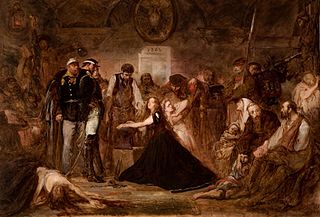
The January Uprising was an insurrection instigated principally in the Russian Partition of the former Polish-Lithuanian Commonwealth against its occupation by the Russian Empire. It began on January 22, 1863 spread to the other Partitions of Poland and continued until the last insurgents were captured in 1864.
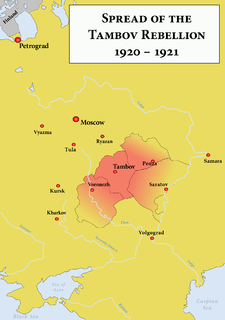
The Tambov Rebellion, which occurred between 1920 and 1921, was one of the largest and best-organized peasant rebellions challenging the Bolshevik regime during the Russian Civil War. The uprising took place in the territories of the modern Tambov Oblast and part of the Voronezh Oblast, less than 300 miles southeast of Moscow.

The Khanate of Kazan was a medieval Tatar Turkic state that occupied the territory of former Volga Bulgaria between 1438 and 1552. Its khans were the patrilineal descendants of Tugh Temür, the thirteenth son of Jochi and grandson of Genghis Khan. The khanate covered contemporary Tatarstan, Mari El, Chuvashia, Mordovia, and parts of Udmurtia and Bashkortostan; its capital was the city of Kazan. It was one of the successor states of the Golden Horde, and it came to an end when it was conquered by the Tsardom of Russia.

The modern administrative-territorial structure of Russia is a system of territorial organization which is a product of a centuries-long evolution and reforms.
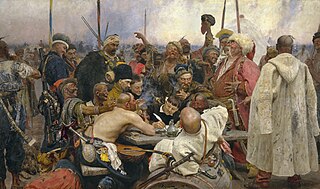
The Ural Cossack Host was a cossack host formed from the Ural Cossacks -- those Eurasian cossacks settled by the Ural River. Their alternative name, Yaik Cossacks, comes from the old name of the river.

Koliyivshchyna was a major haidamaka rebellion that broke out in Right-bank Ukraine in June 1768, caused by the dissatisfaction of the peasants because of the serfdom oppression, the anti-nobility and anti-Polish moods among the Cossacks and peasants. The uprising was accompanied by violence against Poles, Jews and Roman Catholic and Uniate clergy, culminating in the massacre of Uman. The number of victims is estimated from 100,000 to 200,000

The Kazan Governorate, or the Government of Kazan, was a governorate of the Tsardom of Russia, the Russian Empire, and the Russian SFSR from 1708–1920, with its seat in the city of Kazan.

Pugachev's Rebellion of 1773-75 was the principal revolt in a series of popular rebellions that took place in the Russian Empire after Catherine II seized power in 1762. It began as an organized insurrection of Yaik Cossacks headed by Yemelyan Pugachev, a disaffected ex-lieutenant of the Imperial Russian Army, against a background of profound peasant unrest and war with the Ottoman Empire. After initial success, Pugachev assumed leadership of an alternative government in the name of the assassinated Tsar Peter III and proclaimed an end to serfdom. This organized leadership presented a challenge to the imperial administration of Catherine II.
Mameshbirde was a rebel commander during Kazan War for the independence of Kazan Khanate in 1552-1556. As legend says, he was a son of Mari noble and Chuvash noble woman.
The Arsk uprising was a Tatar peasant rebellion against the Soviet power in Kazan, Layesh, Mamadysh uyezds of Kazan Governorate. It started on October 25, 1918 as a result of prodrazvyorstka policy. On November 10 rebels took the town of Arsk. Red guards with cannons were sent to suppress the rebellion. On November 15 the rebellion was defeated, 31 rebels were killed, 11 wounded. The participants of the rebellion repaid a contribution to the Soviet power.
The Pitchfork Uprising of 1920, also known as Black Eagle Uprising, was a peasant uprising against the Soviet policy of the war communism in what is today Eastern Tatarstan and Western Bashkortostan. It started in the village of Yanga Yelan, Menzelinsky Uyezd, Ufa Governorate on February 4, 1920, where local peasants tried to resist confiscation of their food. When they refused to give up their produce, the leader of the military confiscation unit ("prodotryad") arrested some of them. Peasants asked him to free the hostages, but he refused. Peasants killed the members of prodotryad and circulated the appeal to rise.
The history of Chuvashia spans from the region's earliest habitation by Finno-Ugric peoples to its incorporation into the Russian Empire and its successor states.
Ille Tăhti is a Chuvash writer and folklorist, and a member of USSR Union of Writers since 1934.
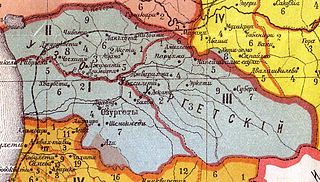
The 1841 rebellion in Guria was a conflict in the former Georgian principality of Guria, at that time part of the Georgia-Imeretia Governorate of the Russian Empire, that took place as a reaction to the government's newly introduced duties and taxes for the Georgian peasants. The rebels, joined by several nobles, were initially successful in overrunning much of Guria, but they were finally defeated by the Russian army and the allied Georgian nobility in September 1841.

Stepan Maximovich Petrichenko was a Russian revolutionary, an anarcho-syndicalist politician, the head of the Soviet Republic of Soldiers and Fortress-Builders of Nargen and in 1921, de facto leader of the Kronstadt Commune, and the leader of the revolutionary committee which led the Kronstadt rebellion of 1921.

The Kronstadt rebellion was a major unsuccessful uprising against the Bolsheviks in March 1921, during the later years of the Russian Civil War. Led by Stepan Petrichenko and consisting of Russian sailors, soldiers, and civilians, the rebellion was one of the reasons for Vladimir Lenin's and the Communist Party's decision to loosen its control of the Russian economy by implementing the New Economic Policy (NEP).
Daniel Elmen was a Chuvash state and political figure, the first Chairman of the Chuvash regional executive committee.
Tenäk Temejĕ, Russian: Temey Tenyakov) was a Chuvash nobleman and the last native Chuvash to hold the title pü, which is equivalent to the European prince and the Russian knyaz. His name occurs in financial documents from the 1620s and in Chuvash legends..

The Kazan electoral district was a constituency created for the Russian Constituent Assembly election, 1917.

